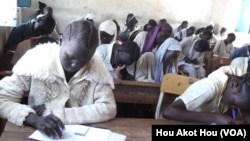South Sudan's first ever high school exams, which began this week, have been marred by a shortage of test papers and poorly written questions, officials and students say.
Josephine Keji, a student at Juba Commercial Secondary School, said many of the questions on the exam, which is required to gain a place at university, were not covered by the high school syllabus, and some exams were missing questions altogether.
“When the teacher saw the paper, he became annoyed and said, ‘Why? Why would you set a question like this for those kids? I did not teach them like that.’ And then he went, ‘Actually the paper is no good,’” she said.
Many of the 1,500 students sitting the exam in Unity state spent Monday morning waiting for their test papers to arrive. State officials said they had not received enough exams from Juba for all of the students.
Unity state Minister of Education Angelo Chol blamed the problems on the National Examinations Council, which is responsible for writing and delivering the tests.
“We have some challenges or some problems that faced us… since we started the examination, that is, the deployment of some papers of the examination up to now," he said.
The Secretary General of the Examination Council Rajaf Sederia Abdalla apologized for the test shortages, but reminded citizens that this was a new experience for South Sudan.
"There is some technical mistake concerning the packing of the papers in the envelopes, which was confused …We apologize for that mistake. It is the first time for us to do that," he said.
The exam period is due to continue for another two weeks, but one student's father, called for testing to be cancelled and new papers to be printed so that "if later on these people fail, let them fail because the exam is very hard for them, not because there was a mistake in it.”
Josephine Keji, a student at Juba Commercial Secondary School, said many of the questions on the exam, which is required to gain a place at university, were not covered by the high school syllabus, and some exams were missing questions altogether.
“When the teacher saw the paper, he became annoyed and said, ‘Why? Why would you set a question like this for those kids? I did not teach them like that.’ And then he went, ‘Actually the paper is no good,’” she said.
Many of the 1,500 students sitting the exam in Unity state spent Monday morning waiting for their test papers to arrive. State officials said they had not received enough exams from Juba for all of the students.
Unity state Minister of Education Angelo Chol blamed the problems on the National Examinations Council, which is responsible for writing and delivering the tests.
“We have some challenges or some problems that faced us… since we started the examination, that is, the deployment of some papers of the examination up to now," he said.
The Secretary General of the Examination Council Rajaf Sederia Abdalla apologized for the test shortages, but reminded citizens that this was a new experience for South Sudan.
"There is some technical mistake concerning the packing of the papers in the envelopes, which was confused …We apologize for that mistake. It is the first time for us to do that," he said.
The exam period is due to continue for another two weeks, but one student's father, called for testing to be cancelled and new papers to be printed so that "if later on these people fail, let them fail because the exam is very hard for them, not because there was a mistake in it.”




